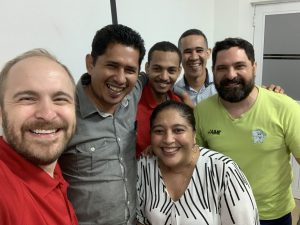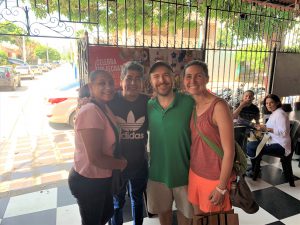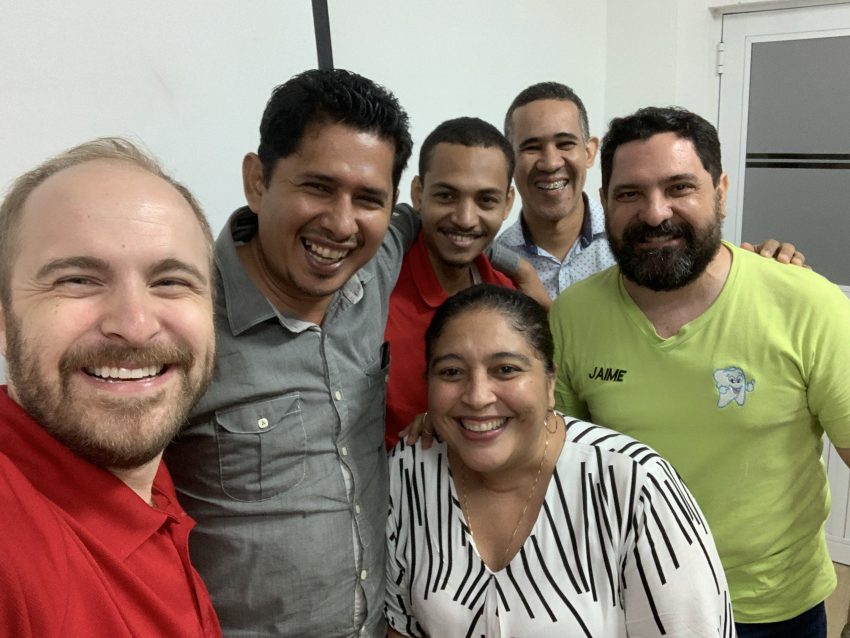When the Rev. Michael Wallace ’14 was a student at Pittsburgh Theological Seminary, he imagined someday getting a Ph.D. and teaching theology. In the years since, as the associate pastor of Christ Presbyterian Church in Canton, Ohio, he has retained a passion for the classroom. That passion led Michael and his family to a four-month sabbatical in Barranquilla, Colombia in 2023, during which he taught systematic theology at Corporación Universitaria Reformada (CUR), a university of the Presbyterian Church of Colombia.
Pittsburgh Theological Seminary is in partnership with several international institutions of higher education, including Corporación Universitaria Reformada. These partnerships help members of the PTS community better understand the global nature of the Church, develop relationships with individuals and groups across cultures, and engage in mutual learning and research with faculty around the world.
Grounding Theological Reflection in Worship
 At CUR, Michael shared more with his students than the theology he had learned during his M.Div. studies. Following the example of former PTS professor Dr. Jannie Swart (1962- 2014), Michael began each class period by drawing students’ attention to a lit candle. The candle, he says, was a visible reminder that as they entered the classroom, the Holy Spirit was already present in the space. He would then lead an activity called “Dwelling in the Word,” which included reading Scripture and inviting students to meditate on what they noticed about the reading then shared their reflections in small groups. Following a time of singing and praying, they were finally ready to begin the lesson of the day in theology.
At CUR, Michael shared more with his students than the theology he had learned during his M.Div. studies. Following the example of former PTS professor Dr. Jannie Swart (1962- 2014), Michael began each class period by drawing students’ attention to a lit candle. The candle, he says, was a visible reminder that as they entered the classroom, the Holy Spirit was already present in the space. He would then lead an activity called “Dwelling in the Word,” which included reading Scripture and inviting students to meditate on what they noticed about the reading then shared their reflections in small groups. Following a time of singing and praying, they were finally ready to begin the lesson of the day in theology.
“I approached teaching theology through the lens of worship,” Michael says. “That was the foundation before we could get into talking about the Trinity and atonement and all those other matters that we dove into throughout the semester.”
Re-Ordering Vocational Identities

Before the experience in Colombia, Michael had always thought of himself as a scholar first and pastor second. Now, he sees those identities flipped: he’s a pastor first and a scholar second. But it’s clear in talking with Michael that he has a heart for both deep theological reflection and pastoring in community.
“I think seminary planted seeds that I didn’t even know were there, and they sprouted when I stepped behind the teacher’s desk. I started teaching and realized church and theology can’t be disconnected. My students were already in church contexts. We can’t just learn theology for the sake of knowledge; there has to be some applied component to it, or else, what are we doing?” he says.
Michael credits several of his PTS professors for instilling this approach, including the Rev. Dr. Jannie Swart, Hugh Thomson Kerr Professor of Pastoral Theology the Rev. Dr. Roger Owens, James Henry Snowden Professor of Systematic Theology the Rev. Dr. John Burgess, and G. Albert Shoemaker Professor Emeritus of Archaeology Dr. Ron Tappy. These professors didn’t teach from an ivory tower but were engaged in ministry and lived what they taught in church and community.
Discovering Geographic Identity
Teaching courses in Spanish challenged Michael. Even though he has a master’s degree in Spanish, the particular dialect in Barranquilla was difficult for him to understand. There were some other cultural differences—like the extremely hot and humid climate, local holidays, and differences in infrastructure in their urban locale—that pushed him and his family out of their comfort zones as well.
 Michael appreciated these challenges. It was good to leave home and experience an entirely new culture in a different part of the world. And it was good to return home to Canton, Ohio. He explains: “Going away was helpful in that it more clearly defined my identity, and our identity as a family. We are Cantonians. This is our home, these are our friends, these are our people, and we want to stay and be here as long as the church and Lord will have us here.” He adds, “We’re glad to have gone. We’re glad to be back. And I take that in every sense of the meaning for both.”
Michael appreciated these challenges. It was good to leave home and experience an entirely new culture in a different part of the world. And it was good to return home to Canton, Ohio. He explains: “Going away was helpful in that it more clearly defined my identity, and our identity as a family. We are Cantonians. This is our home, these are our friends, these are our people, and we want to stay and be here as long as the church and Lord will have us here.” He adds, “We’re glad to have gone. We’re glad to be back. And I take that in every sense of the meaning for both.”
A Re-Calling to Ministry
Ultimately, this experience was a “re-calling” to the vocation of pastoral ministry for Michael. The Rev. Jeff Bergeson ’14, Michael’s PTS classmate and friend, told him that his own sabbatical was in part a way of being “re-called” to ministry. Before going to Colombia, Michael didn’t know what Jeff meant by this, but now he does. His time in Colombia widened his understanding of what ministry can be like, both by further synthesizing Michael’s identities of pastor and scholar and by interacting with CUR students, most of whom are already serving in ministry.

Furthermore, most pastors in Colombia are bi-vocational, which got Michael thinking about what we in the United States can learn from Colombians. As many communities here face dwindling numbers and resources, Michael wonders if his experience is a call to hear God speaking in new, creative, and generative ways.
“God did so many things beyond us that we didn’t even know about, and there were certainly bumps along the way,” Michael says, “but God worked through all of it. I know that we were changed by our contact with the beautiful people of Colombia, and we hope that we blessed them back. Whether or not we go back to Colombia—that’s still an open question. But we have memories that’ll last a lifetime, and we thank God for that opportunity.”

